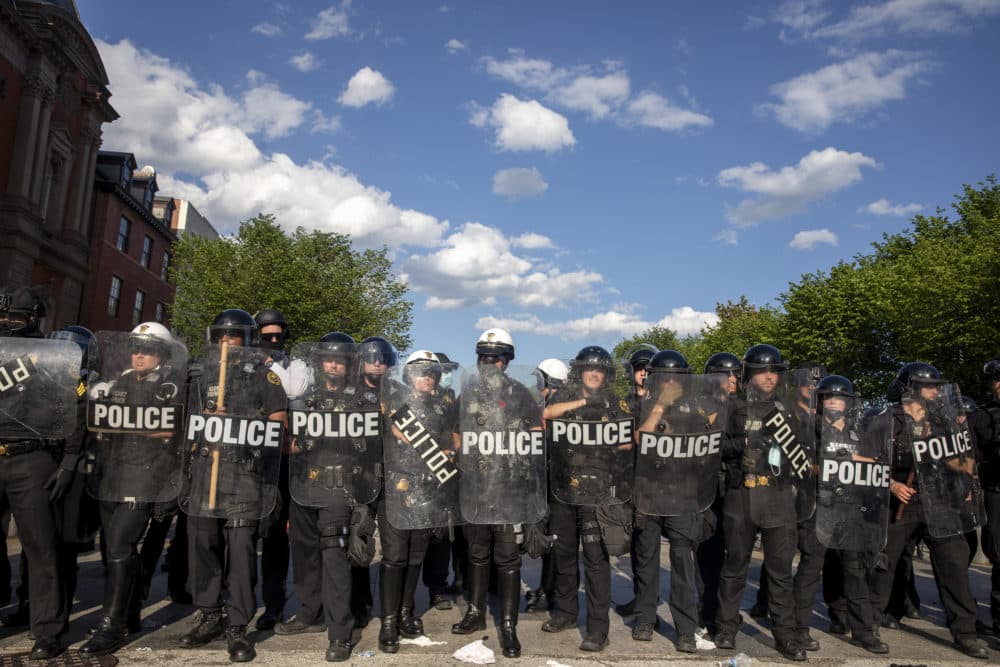Advertisement
Sociologist Michael Sierra-Arévalo On Why Police Expect Danger And How It Drives Brutality

Sociologist Michael Sierra-Arévalo spent 1,000 hours with police officers in the field. Ride-alongs, high speed chases, patrols. He says they’re taught to expect danger at every moment on the job. And that expectation is a major driver of police brutality.
Guest
Michael Sierra-Arévalo, sociology professor at the University of Texas at Austin. Author of the 2016 paper “American Policing and the Danger Imperative.” (@michaelsierraa)
Daniel Hahn, Sacramento police chief. (@Chief_Hahn)
Interview Highlights
What is the logic behind the perception of danger at car stops?
Michael Sierra-Arévalo: "It is an article of faith that car stops are one of the most dangerous things that officers engaged in. The logic is that you never know who you're trying to stop, which is technically true, unless, of course, you believe that officers are stopping people, that they have good, reasonable suspicion to be stopping because of their belief that they might say have weapons or have committed a crime. But if it is indeed random, which would be a problem in and of itself, the logic goes that you don't know if they have a gun.
"... One officer in Elmont proposed to me the hypothetical, 'You don't know if the person that you're stopping is coming from a murder or if they've just finished kidnapping somebody.' You don't know. And so this uncertainty is core to their understanding of what makes every interaction dangerous. You simply do not know. And the potential cost is so high that they must take steps to keep themselves alive."
On racism and policing
Michael Sierra-Arévalo: "I think that what my research and what others research suggests about policing is that the particular arrangement of training and policies and culture that arise from that structure are such that it might exacerbate the problems that we're dealing with, when we talk about race and racism. In large part, because of the power that the chief rightly says the police have. Police have tremendous discretion. They have the legal right to divest people of their liberty and of their lives under certain circumstances.
"And I think part of what makes this problem sticky is that you don't actually need to believe that every police officer is a dyed-in-the-wool bigot and racist that runs around and wants to hurt Black and brown people. This is not a story of monsters. This is a story of ordinary men and women in many regards. What is more important, I think, is to recognize that policing as an institution is born out of unequal power relations. It is borne out of unequal distribution of power, of resources and in many cases, particularly in the U.S. context. That is a story about race. The chief mentioned redlining. He mentioned sundown towns. This is the uncomfortable history of U.S. policing.
"So even today, when you have a well-meaning officer who just wants to do right by his community and make the world a better place, participating in an institution that has arisen and has been perpetuated as one that systematically creates the disparities in who is stopped, searched, arrested and then killed by police is perpetuating the same inequalities that give rise to racism in the first place, that are both the symptom and a cause of it.
Advertisement
"This is not a problem as simple as getting better screening mechanisms to get rid of the quote-unquote 'real racists.' I wish it was that simple, that [we could just] have a good enough filtering system. This is instead a story about systems. This is not a story of bad apples. It's not even really a story about bad barrels or bad trees, so to speak. This is a story about the roots of the policing orchard and what the institution was designed to do."
On police training
Michael Sierra-Arévalo: "I actually am not convinced that training will save us. We have tried all kinds of things like implicit bias training, de-escalation training and ... intervention training. The problems that I observed in the academy and on patrol are problems that are intentional and built into the very fabric of policing. This is part of the conversation now about reformulating what we even mean by public safety, defunding the police, reformulating and changing the role of police in society. And that, I think, is the real way forward."
From The Reading List
The Atlantic: "How to Actually Fix America’s Police" — "George Floyd’s death is the latest in a long series of brutal encounters between the police and the people they are supposed to serve."
GQ: "How Violent Police Culture Perpetuates Itself" — "The past month has shone a long-overdue light on police brutality and, along with it, a whole range of alarming attitudes that seem to pervade police forces across the country."
Vox: "What the police really believe" — "Arthur Rizer is a former police officer and 21-year veteran of the US Army, where he served as a military policeman."
New York Times: "Opinion: Want to Abolish the Police? Consider Becoming an Officer Instead" — "For the past few years, I’ve taught a seminar on the sociology of the police at Colby College in Maine."
Salon: "State violence, a crisis of legitimacy, and the path to true public safety" — "Let's be clear about what's been happening in the country these last few weeks. Policing is an arm of the state."
This program aired on July 16, 2020.

